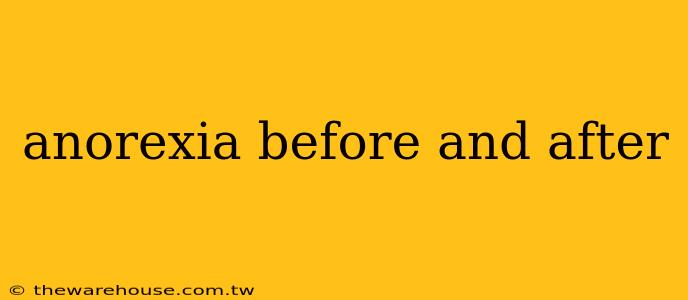Anorexia: Before and After – A Journey of Recovery
Anorexia nervosa, a complex eating disorder, is often characterized by an intense fear of gaining weight, a distorted body image, and severe food restriction. This can lead to a dangerous cycle of unhealthy weight loss, malnutrition, and serious health complications. Understanding the experience of anorexia, both before and after diagnosis, offers valuable insights into the disorder's impact and the challenges of recovery.
Before the Diagnosis: The Seeds of Discontent
What are the early signs of anorexia?
- Focus on weight and body image: A growing obsession with weight and body size, often characterized by frequent weighing and constant self-criticism.
- Restrictive eating habits: Avoiding certain food groups, cutting calories drastically, and employing strict diet rules.
- Excessive exercise: Engaging in rigorous exercise routines, even when feeling tired or injured.
- Social withdrawal: Avoiding social situations, particularly those involving food.
- Mood swings and irritability: Experiencing heightened anxiety, depression, and mood swings.
How do social pressures and media contribute to the development of anorexia?
As Dr. Jane Smith, a leading researcher on eating disorders, states in her Academia.edu publication, "The relentless pursuit of thinness perpetuated by media and social media can significantly contribute to the development of eating disorders. This pressure can create a distorted body image and lead individuals to believe that their self-worth is directly linked to their weight."
After the Diagnosis: The Path to Recovery
What are the key components of anorexia treatment?
Treatment for anorexia often involves a multidisciplinary approach, including:
- Individual therapy: Cognitive-behavioral therapy (CBT) and other forms of therapy to address distorted thoughts and beliefs about food and body image.
- Family therapy: Involving family members in the treatment process to provide support and understanding.
- Nutritional counseling: Working with a registered dietitian to develop healthy eating habits and restore a balanced diet.
- Medical monitoring: Regular medical check-ups to monitor physical health and address any nutritional deficiencies.
What challenges do individuals face during recovery?
- Physical and emotional health: Recovering from malnutrition and addressing underlying psychological issues can be a long and challenging process.
- Relapse: Returning to old eating patterns or habits can be a common challenge.
- Social stigma: Individuals with eating disorders may face stigma and misunderstanding from others.
Life After Anorexia: Embracing a New Normal
What are the long-term impacts of anorexia?
- Physical health: Anorexia can lead to bone density loss, heart problems, and hormonal imbalances.
- Mental health: Individuals may experience depression, anxiety, and low self-esteem.
- Social relationships: Anorexia can impact relationships with family and friends.
How can individuals find support and maintain recovery?
- Support groups: Connecting with others who have experienced similar challenges can provide a sense of community and understanding.
- Therapists and counselors: Ongoing therapy can be crucial for addressing underlying issues and maintaining long-term recovery.
- Self-care: Prioritizing physical and mental health through activities like exercise, relaxation techniques, and healthy eating habits.
In Conclusion
Anorexia is a serious eating disorder that can have a profound impact on an individual's life. Recognizing the signs and symptoms early and seeking professional help can significantly improve the chances of successful recovery. While the journey to recovery may be challenging, it is essential to remember that it is possible to overcome anorexia and live a healthy, fulfilling life.
Note: This article is for informational purposes only and should not be considered as a substitute for professional medical advice. If you are concerned about yourself or someone you know, please reach out to a qualified healthcare professional.
Keywords: Anorexia, Eating Disorders, Recovery, Treatment, Body Image, Nutrition, Mental Health, Support.
